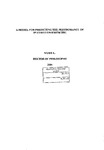A MODEL FOR PREDICTING THE PERFORMANCE OF IP VIDEOCONFERENCING
| dc.contributor.author | MUED, LICHA | |
| dc.contributor.other | Faculty of Science and Engineering | en_US |
| dc.date.accessioned | 2013-09-25T09:04:35Z | |
| dc.date.available | 2013-09-25T09:04:35Z | |
| dc.date.issued | 2004 | |
| dc.identifier | NOT AVAILABLE | en_US |
| dc.identifier.uri | http://hdl.handle.net/10026.1/1952 | |
| dc.description.abstract |
With the incorporation of free desktop videoconferencing (DVC) software on the majority of the world's PCs, over the recent years, there has, inevitably, been considerable interest in using DVC over the Internet. The growing popularity of DVC increases the need for multimedia quality assessment. However, the task of predicting the perceived multimedia quality over the Internet Protocol (IP) networks is complicated by the fact that the audio and video streams are susceptible to unique impairments due to the unpredictable nature of IP networks, different types of task scenarios, different levels of complexity, and other related factors. To date, a standard consensus to define the IP media Quality of Service (QoS) has yet to be implemented. The thesis addresses this problem by investigating a new approach to assess the quality of audio, video, and audiovisual overall as perceived in low cost DVC systems. The main aim of the thesis is to investigate current methods used to assess the perceived IP media quality, and then propose a model which will predict the quality of audiovisual experience from prevailing network parameters. This thesis investigates the effects of various traffic conditions, such as, packet loss, jitter, and delay and other factors that may influence end user acceptance, when low cost DVC is used over the Internet. It also investigates the interaction effects between the audio and video media, and the issues involving the lip sychronisation error. The thesis provides the empirical evidence that the subjective mean opinion score (MOS) of the perceived multimedia quality is unaffected by lip synchronisation error in low cost DVC systems. The data-gathering approach that is advocated in this thesis involves both field and laboratory trials to enable the comparisons of results between classroom-based experiments and real-world environments to be made, and to provide actual real-world confirmation of the bench tests. The subjective test method was employed since it has been proven to be more robust and suitable for the research studies, as compared to objective testing techniques. The MOS results, and the number of observations obtained, have enabled a set of criteria to be established that can be used to determine the acceptable QoS for given network conditions and task scenarios. Based upon these comprehensive findings, the final contribution of the thesis is the proposal of a new adaptive architecture method that is intended to enable the performance of IP based DVC of a particular session to be predicted for a given network condition. | en_US |
| dc.language.iso | en | en_US |
| dc.publisher | University of Plymouth | en_US |
| dc.title | A MODEL FOR PREDICTING THE PERFORMANCE OF IP VIDEOCONFERENCING | en_US |
| dc.type | Thesis | |
| plymouth.version | Full version | en_US |
| dc.identifier.doi | http://dx.doi.org/10.24382/3869 |
Files in this item
This item appears in the following Collection(s)
-
01 Research Theses Main Collection
Research Theses Main


